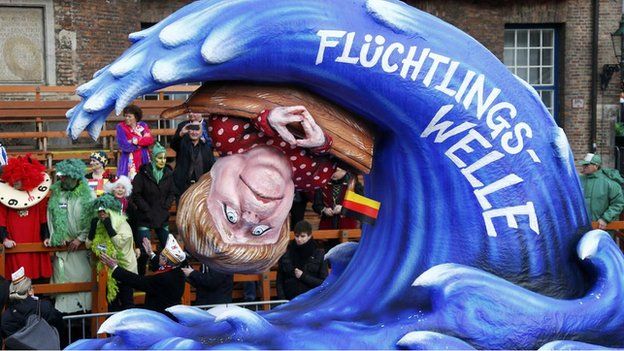How Germans are using carnival to highlight the migrant crisis
- Published

It is carnival season in Germany and amid the brightly coloured floats and giant papier mache figures, some displays linked to Europe's migrant crisis have provoked controversy.
In a country that is struggling with a record influx of migrants and refugees, it is perhaps unsurprising that this has dominated, but concerns have also been raised about the limits of satire.
One of the most shared images came from a carnival in a small municipality in southern Germany that featured a tank labelled "asylum defence" ("Asylabwehr").
Florian Simbeck, a German comedian and local politician, posted a picture of Sunday's display of the tank at a parade in the municipality of Steinkirchen in southern Germany. It was shared more than 2,500 times and started a debate about the morality of the display.
"I think it was in very bad taste and unacceptable. The tank should not have been permitted to the parade," Mr Simbeck told BBC News.
Other social media users said the tank was of satirical nature and should be seen as a sideswipe at Alternative for Germany (AfD), a right-wing populist party.
Mr Simbeck, who first posted the picture, said that satire needs a clear reference.
"Maybe it was not intended to cause any offence, but I could not just let the tank pass by without taking any action," he said.
Twitter user Robert Fietzke likened the tank to a float in Cologne's 1933 carnival parade that was titled "The last ones are leaving" ("Die Letzten ziehen ab") - a reference to Jewish emigration from Nazi Germany.
Several participants at the parade reported the incident to the police and prosecutors are now deliberating whether to open an investigation.
The head of the association responsible for the parade has apologised on German public television about the display.
In the central German state of Thuringia, police have opened an investigation into another controversial carnival float: a train titled "Balkan Express".
Critics say the term and the slogan on the train's front ("The plague is arriving") refers to the Balkan route taken by the majority of migrants arriving in Germany.
Other images of the parade on social media show the train being accompanied by a group of people dressed as green locusts.
Locust can be used in German to refer to people exploiting a social welfare system.
Martin Holland said on Twitter: "Humour targeting the weakest and poorest is cowardly and miserable. Besides, it is not funny at all."
The European migrant crisis also dominated carnival parades in major cities across Germany.
One of the carnival floats depicted the German federal eagle getting frightened as one of its wings burns due to attacks on refugee shelters.
Another display shows Horst Seehofer, Bavaria's State Premier, trying to close European borders.
Many of the traditional parades on Rose Monday, the highlight of the annual carnival season, were cancelled due to severe weather warnings.
The organisers in Dusseldorf, one of the cities that cancelled the festivities, displayed the floats in front of the town hall.
The parade in Cologne, the biggest of its kind in Germany, went ahead despite weather warnings.
After many women suffered sexual assaults and robberies there on New Year's Eve, Cologne beefed up security, putting 2,500 police officers on the streets.
Police in Cologne said on Monday that 45 incidents of sexual assault had been reported in the week-long event.
This included a Belgian journalist being groped during a live report from the carnival.
- Published8 February 2016
- Published4 February 2016
- Published8 February 2016